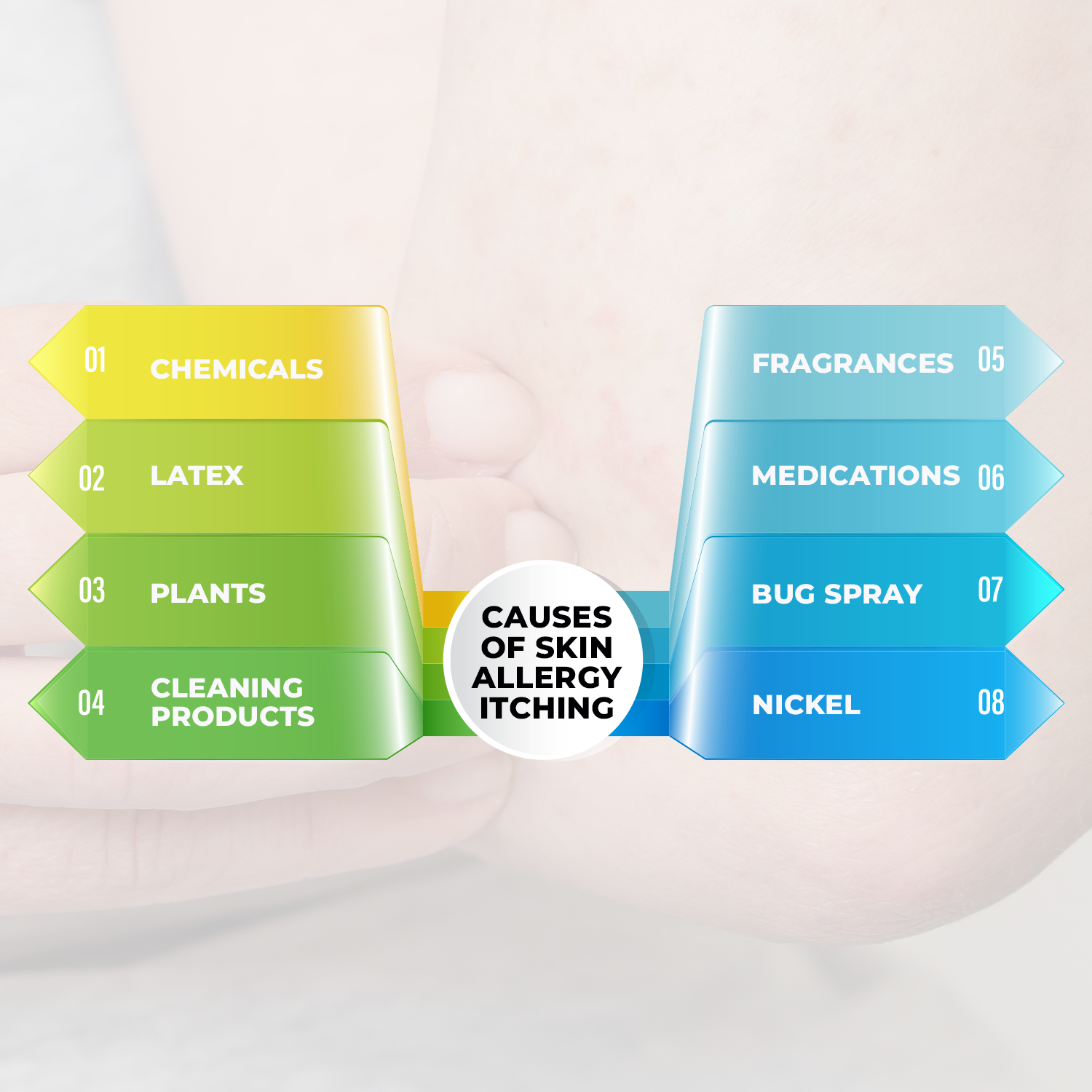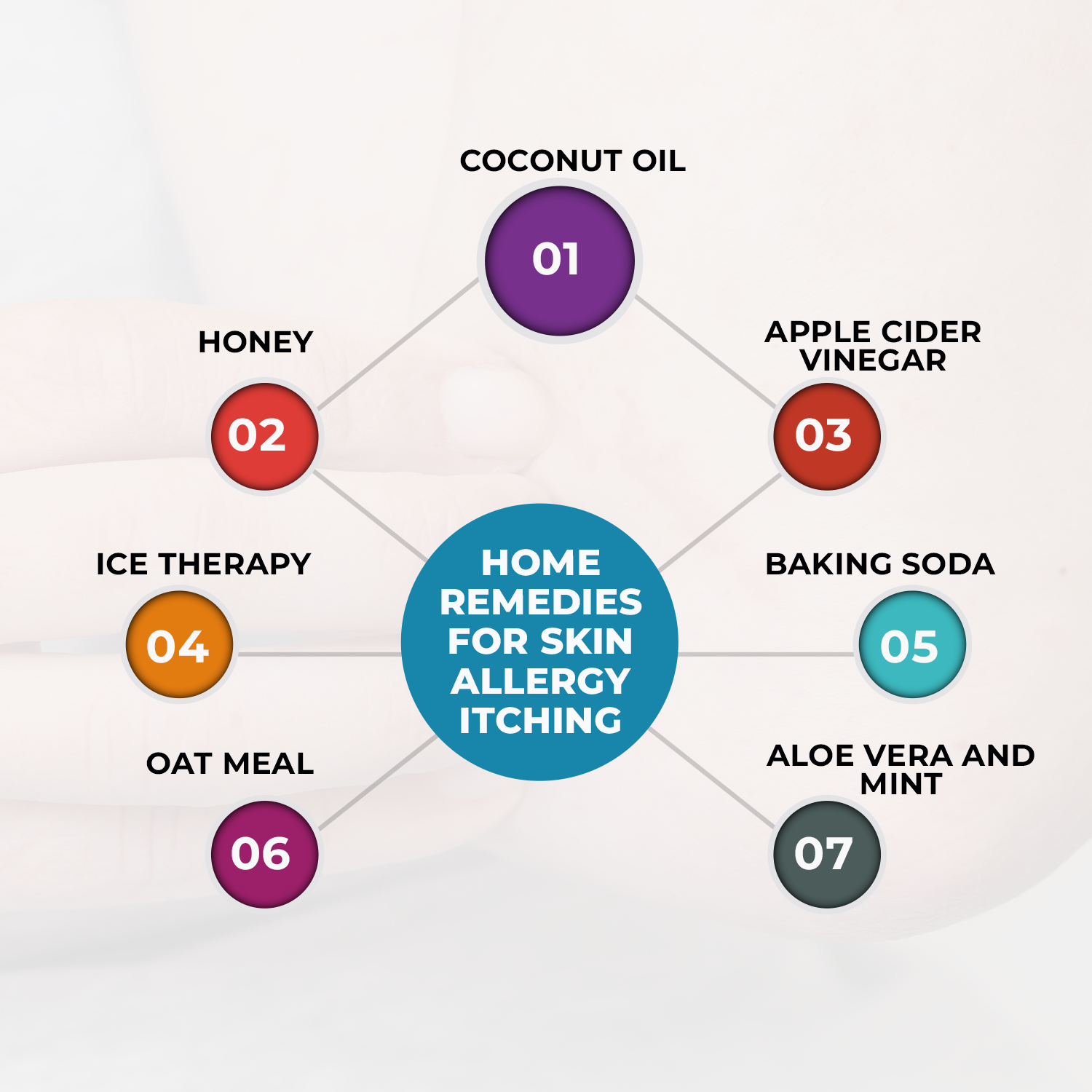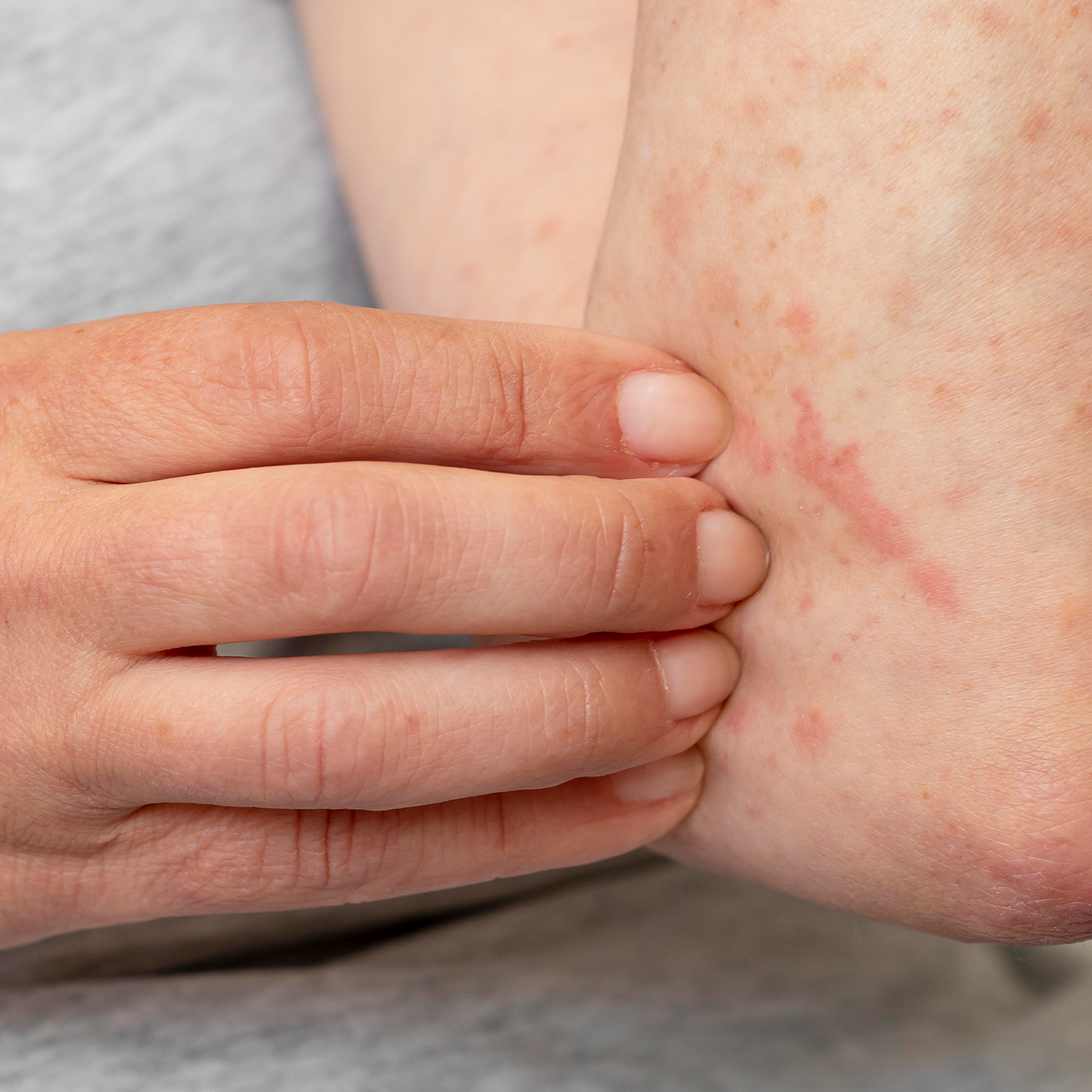


Hives, rashes, itchy patches, swelling or flaking, are common symptoms of an allergic reaction. A skin allergy is a condition everyone has probably experienced. Because the skin is the first point of contact with the outside world, allergen exposure starts here, and so do the allergies. However, you can take steps to relieve skin allergies, including home remedies for allergy itching. The symptoms of skin allergies – such as swelling, itching, and redness – often disappear on their own within a week or two, with or without treatment. However, in the meantime, you can consider some natural remedies to reduce the discomfort that comes with the allergy.
You will learn the following from this post:
Table of Contents
- Meaning of skin allergies
- Causes of skin allergies
- Symptoms of skin allergy itching
- How skin itching is diagnosed
- Complications associated with skin itching
- Home remedies for skin allergy itching
What Are Skin Allergies?
A person develops skin allergies when the immune system reacts to a certain threat it perceives. Most of the threats that trigger skin allergies are typically harmless to the body. Generally, skin allergies are a part of the most common medical conditions people experience. The substances that cause the immune system to react are known as allergens. How the skin responds to these allergens is known as Allergic Skin Reaction—the reaction results from some antibodies that the body produces to defend against the allergens.
Common skin allergies include swelling, rash, itchiness, redness, flaking and dryness. There may also be raised bumps that become itchy – the bumps often look like a bite from an insect. The typical allergic skin conditions include Angioedema, Hive, Contact Dermatitis, and Eczema (Atopic Dermatitis).
Several home remedies for skin allergy itching have been found helpful in treating skin allergies. These home remedies deal with both the external skin and internal body challenges responsible for the allergies. In addition, natural remedies provide a long-term healing effect with little or no side effects.
What Causes Skin Allergies?

Causes Skin Allergies
It takes about 10 days for the skin to become sensitive to something after it has come in contact with it. You might even be able to put your skin in contact with something for some years before you develop an allergic reaction to it. However, as soon as you develop an allergy, your body could trigger a response within a couple of minutes of coming in contact with it, or it might take a day or two.
The most generally-known causes of skin allergies include the following:
- chemicals
- latex, used for stretching stuff, such as balloons, condoms, elastic in clothing, and plastic gloves
- plants, including poison ivy
- cleaning products
- fragrances
- medications you apply to your skin, such as anti-itch creams or antibiotics
- bug sprays and sunscreens
- nickel, a metal used in snaps on shampoos, soaps, lotions, makeup, and jeans
You’re more prone to specific skin allergies if you have a skin condition, such as eczema (atopic dermatitis), itching in your private parts, inflammation in your lower legs due to poor blood circulation, or you often get swimmer’s ear. You can develop skin allergies in several ways, but most of the conditions can be treated with home remedies for skin allergy itching.
Symptoms of Skin Allergy Itching
A skin rash is the major symptom of an allergic skin reaction. The rash may begin as redness, a raised bump, or an itching sensation, and you may experience any combination of:
- cracked skin
- flaking or scaling of the skin
- raised bumps
- swelling
- redness
- itching
- rash
Depending upon the underlying cause of skin itching, the condition may be associated with other signs and symptoms. The common associated findings of this condition include skin lesions like
- redness of the affected area
- blisters
- bumps, or
- rash
Skin dryness is a common cause of skin itching, and itching can result in tears in the skin due to scratching. Less commonly, itching all over the body can indicate chronic medical conditions like liver disease. In this case, there may be no alteration to the skin’s appearance.
Several kinds of skin allergies have telltale patterns and symptoms that will help you identify the type of condition you have.
Diagnosing Skin Itching
Just like any other condition, a careful physical examination and confirmation of medical history will reveal to your healthcare provider the particular diagnostic tests that may be required to learn the cause of itching. Some common causes of the condition, such as sunburn and dry skin, may be obvious, while causes like chronic systemic diseases or health conditions may require imaging or blood tests to identify. If a skin condition is the cause of the itch, sometimes a biopsy or scraping may be performed to determine the condition. Nonetheless, many common skin itching and ailments have a characteristic appearance or symptom that may suggest the correct diagnosis.
Is Preventing Itching Possible?
You can prevent itching only to the extent that the condition’s underlying cause can be prevented. It will be hard to prevent skin itching if the underlying cause of it is not taken out.
- For instance, careful use of sunscreen can prevent itching linked with sunburn.
- Using moisturizers and keeping well-hydrated can prevent the itch linked with dry skin.
- It is also possible to consider preventive measures to be protected against contagious conditions that may be passed from one skin coming in contact with another, such as:
- Lice infestations that may be responsible for itching
- Bug or tick bites, or
- Sexually transmitted diseases
Ensure that you get a medical evaluation for your condition if home remedies for skin allergy itching do not relieve you of the condition and its symptoms.
Complications Associated with Skin Itching
Secondary bacterial infection of the skin is probably the most common complication of itching. The secondary infection occurs not due to the itch but due to scratching. A patient may need antibiotics to treat the skin’s bacterial infection, and itching alone may likely result in other complications, even though some of the underlying infections responsible for itching are associated with complications specific to the disease.
Home Remedies for Skin Allergy Itching

Home Remedies For Skin Allergy Itching
You can apply lotion and cream products on the skin every couple of minutes for most itching conditions that are probably not due to skin allergies. These remedies will help numb the nerve endings and prevent a frenzy of scratching, which causes the skin to become itchier, sore, and raw. However, if you know that your itching is a result of a skin allergy, you should consider the following natural remedies:
1. Coconut Oil
Coconut oil is effective in softening the skin, reducing itching, flaking, and dryness of the skin. In addition, coconut oil decreases the level of inflammation and supports the healing of the skin. The vitamin K, vitamin E and medium-chain fatty acids that coconut oil contains are necessary ingredients that penetrate the skin and help moisturize and treat the skin’s condition. You can use coconut oil directly or mix it with an equal quantity of olive oil. Then, gently apply the oil to the skin and allow it to remain there for about 30 minutes. Using coconut oil after taking your bath keeps the skin soft and free of problems, especially if your skin is sensitive.
2. Honey
Honey has been a choice remedy for various skin conditions for years. It is especially effective in promoting rapid tissue healing and encouraging the growth of new skin to prevent the development of bacteria. You can directly apply honey to your skin two to three times each day. Allow it to remain on your skin for about half an hour before rinsing it off with lukewarm water. You can also mix one part of honey with a part of cinnamon powder and apply the mixture to your skin. Consuming lukewarm water with just a tablespoon of lime juice and honey effectively clears up the symptoms of skin allergies.
3. Apple Cider Vinegar
The antibacterial and antifungal properties and high levels of minerals ( such as potassium) make apple cider vinegar a popular choice for treating skin allergies. ACV (apple cider vinegar) helps detoxify the body, boost the immune system, and balance the skin’s pH levels. Mix apple cider vinegar and water in the exact quantities, and use a cotton swab to apply the mixture to your skin. You can choose to pour this mixture into a spray bottle and spurt on the areas affected about two to three times each day until the skin allergy has cleared. For sensitive skin, you can also include one to two cups of apple cider vinegar in lukewarm bathwater. Soak yourself in this water for about half an hour. This will help you treat widespread and severe cases of dermatitis. ACV is also effective when you take it orally. Dilute a tablespoon of apple cider vinegar in a cup of water and drink it two times each day. You can add a teaspoon of honey if you want it to taste better.
4. Ice Therapy
This is one of the simplest home remedies for skin allergy itching. All you have to do is to simply place an ice pack over your eczema patches for about a quarter of an hour. Practicing this ice therapy will help numb the skin and decrease blood circulation to the affected area. When the ice pack is taken off, the veins will begin to dilate, and blood rushes to the area carrying nutrients, which helps enable the healing of the damaged tissues and flush out the toxins. Ice therapy provides relief from itching.
5. Baking Soda
Baking soda is known to possess skin cleansing and antiseptic properties that will help clear off bacteria on the skin. Baking soda gently exfoliates the skin to decrease irritation and itching of eczema-affected areas. Add half a cup of baking soda to a tub of water. Soak in the water for about half an hour. Then wash up with lukewarm water. You can also add a cup of ground oatmeal or two to three tablespoons of olive oil to bath water for added benefits. A simple alternative method is to create a paste by mixing baking soda and water, then apply the mixture directly to the areas affected. Allow it to be there for about ten minutes and wash off with plain water. You can also apply a natural moisturizer, such as olive oil or coconut oil to seal in the hydration.
6. Oatmeal
Oatmeal contains complex sugar, saponins (plant extract), proteins, and fats which help hydrate the skin and keep it from drying out. The gel-like consistency of oatmeal forms a protective barrier against allergens, cleans the skin pores, and lubricates the skin. Grind two cups of oatmeal and pour it into lukewarm bath water. Immerse yourself in the bath for about a quarter of an hour. Gently pat yourself dry with a clean towel. You can practice this treatment two to three times each day until you begin to notice an improvement. Do not stop until your skin allergy itching has totally been cured.
7. Aloe Vera and Mint
Both mint and aloe vera have healing, moisturizing, and soothing effects on the skin. You can apply aloe vera gel on inflamed skin for about thirty minutes and then wash off with lukewarm water. You can repeat this process two to three times each day, depending on the severity of the condition. You can also add a few drops of vitamin E to an aloe vera gel for added benefits. Taking about two tablespoons of ale vera juice in a glass of water each morning provides a detoxifying effect on the body. You can grind mint leaves to a paste or apply the extracted juice directly to the skin. You can also apply a significant infusion of strong mint leaves to the affected areas of your skin.
Final Thoughts
If your skin is allergic to a plant, food, animal, or other substance, there are several home remedies for skin allergy itching that can provide you with relief. As with any treatment you are thinking of using, discuss it with your doctor before trying any medication – natural or otherwise.
Post Disclaimer
The information contained in this post "7 Excellent Home Remedies For Skin Allergy Itching" is for educational purposes only. Always consult your primary care doctor before using the remedies that are provided. The information is provided by The Hidden Cures and while we do timely, in-depth research on the information that we provide to you, everything stated may not be up to date or accurate from the time it was written.



